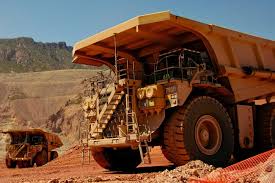WRITTEN BY: Judith Akolo
The African Union Development Agency-NEPAD is urging for utilization of extractive industries in fueling sustainable and inclusive economic growth.
The Director of Progam Innovation and Planning at African Union Development Agency-NEPAD Estherine Fotabong said the mining sector is extremely valuable to Africa’s countries, “and they can be leveraged to fuel sustainable and inclusive economic growth.”
In a statement read on her behalf by the Programme Officer for Knowledge Management, Monitoring and Evaluation at AUDA-NEPAD, Cheikh Tidjane N’dongo, said the mining sector has the potential to generate significant financial benefits and help countries fuel their economic growth and development.
She noted that through direct and indirect job creation, business opportunities, technologies and knowledge transfer and incomes generation the continent can begin to benefit from the resources and ensure a better life “for the citizens of those countries by a sustained poverty reduction and an inclusive growth.”
Fotabong noted that while negotiating mining contracts is an extremely complex endeavour that requires a clear set of objectives articulated by leadership; a variety of technical skills in law, engineering, economics and finance, there is need for high level of coordination across relevant government entities and other key stakeholders to realize success.
“To reach an agreement that is stable over time, the investor-state relationship must be perceived to be fair by the foreign investor and the host government, as well as local communities, broader civil society and the business community,” said Fotabong and added that this can be achieved by incorporating transparency into the process from the onset.
Fotabong noted that, the fact remains that the definition of the fiscal and taxation is key to concluding a win-win contract so as to have the tangible contribution of extractive companies to fiscal revenues of the states.
She noted that while extractive companies, especially mining, carry out activities that often require advanced technology and employ a large workforce, creating new jobs, there is need for more resources to support good growth momentum, strengthen the resilience of their economies and accelerate progress towards social progress in Africa.
The Program Director at the AUDA-NEPAD said the minerals sector is highly capital intensive hence substantial financial resources are needed for investment in the sector several years before the start of operations.
According to the World Bank, natural resources play a dominant economic, social and political role in the lives of 3.5 billion people living in 81 countries. Africa alone is home to about 30% of the world’s mineral reserves, 10% of the world’s oil, and 8% of the world’s natural gas.
The 5th Regional Dialogue and Training on Contract Negotiation and Fiscal Policies in the Extractive Industries is being held in Lusaka, Zambia and is bringing together all the 19 members states of the Common Markets for Eastern and Southern Africa.
They include, Burundi, Comoros, Democratic Republic of Congo, Djibouti, Egypt, Eritrea, Ethiopia, Eswatini, Kenya, Libya, Madagascar, Malawi, Mauritius, Rwanda, Seychelles, Sudan, Uganda, Zambia and Zimbabwe.

